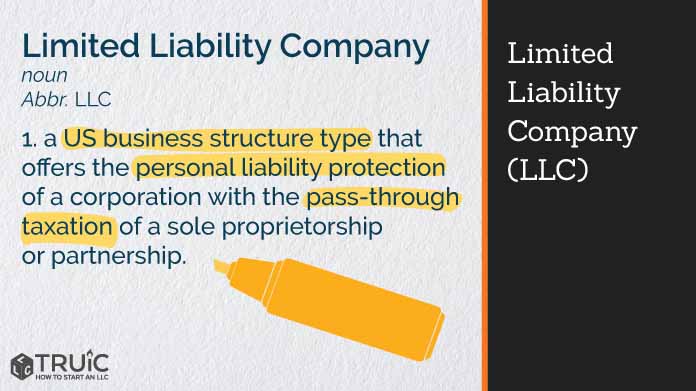LLC Meaning – What Does LLC Mean?
LLC Definition: LLC stands for limited liability company.
LLC Meaning: An LLC is a US business structure that offers the personal liability protection of a corporation with the pass-through taxation of a sole proprietorship or partnership.
Read on to learn more about what an LLC means in business and why it is a popular business structure for new entrepreneurs.
You can create an LLC today with our free Form an LLC guide or with one of these trusted LLC formation services.

What Does LLC Mean?
A limited liability company (LLC) is a formal business structure with one or more owners, known as LLC “members.” An LLC with one owner is a single-member LLC, and an LLC with more than one owner is a multi-member LLC.
Like a corporation, LLCs offer personal liability protection in the event that the business suffers a loss. At the same time, LLCs also benefit from a flexible tax structure: they experience pass-through taxation by default (similar to a sole proprietorship or a partnership), but they can also elect to be taxed as a C corp or S corp. This makes the structure popular because business owners can avoid the double taxation and administrative burden of a corporation while still benefiting from personal asset protection.
Learn more about LLCs:
Should I Form An LLC?
Forming your business as a limited liability company helps:
- Protect your personal assets in the event of a lawsuit against your business
- Reduce paperwork compared to corporations and other legal entity types
- Prevent your company from double-taxation
- Make your business appear more credible to customers and creditors
A limited liability company is just one of several business structure types. Other common examples include:
- Sole Proprietorships
- General Partnerships
- Corporations

Watch our What is an LLC video for a quick rundown on the definition and meaning of LLC and further explaining why LLC formation is a popular business structure for new entrepreneurs.
LLC Taxes
Pass-Through Taxation
By default, an LLC’s profits go directly to its owners, who then report their share of the profits on their individual tax returns. Therefore, an LLC’s profits are only taxed once. This is known as pass-through taxation.
In a C corporation, profits are subject to “double taxation”. This means profits are taxed before being distributed to owners and taxed again when owners report their share of profits on their individual tax returns.
S Corporation Designation
An LLC can file taxes under the “default LLC” classification, or it can elect the S corp designation.
With a default LLC, all company profits pass through to the owners’ personal tax returns, and then the owners must pay income tax and self-employment tax on the entire amount.
With an S corp classification, owners pay income tax and self-employment tax on a predetermined salary. Any profit distributions are only subject to income tax.
Most small businesses file taxes under the default LLC tax classification. You can learn more about when to use the S corporation designation in our LLC vs S corp guide.
How to Form an LLC
When you form your LLC, you will need to complete these steps:
- Name Your LLC
- Choose an LLC Registered Agent
- File Your LLCs Articles of Organization
- Create an LLC Operating Agreement
- Get an EIN
You can start an LLC yourself using our free Form an LLC guide or you can use an LLC formation service to register your LLC for you.
Want help forming an LLC? Check out our recommended LLC formation service: ZenBusiness ($0 + state fees)
Step 1: Name Your LLC
You will need to provide your state with a unique name when you file your LLCs formation documents.
Our business name generator and how to name a business guide are free tools available to entrepreneurs that need help naming their business.
Step 2: Choose an LLC Registered Agent
Your LLC registered agent will accept legal documents and tax notices on your LLC’s behalf. You will list your registered agent when you file your LLC’s Articles of Organization.
Step 3: File Your LLC’s Articles of Organization
The Articles of Organization, also known as Certificate of Formation or Certificate of Organization, is the document you will file to officially register an LLC with the state.
Step 4: Create an LLC Operating Agreement
An LLC Operating Agreement is a legal document that outlines the ownership and member duties of your LLC.
Step 5: Get an EIN
An EIN is a number that is used by the US Internal Revenue Service (IRS) to identify and tax businesses. It is essentially a social security number for a business. You will need to get an EIN after you form your LLC. EINs are free when you apply directly with IRS. Visit our EIN guide for instructions for getting your free EIN.
LLC FAQ
Some advantages of a limited liability company (LLC) include personal asset protection, reduced paperwork when compared to corporations, tax flexibility, and increased credibility with customers and creditors.
The primary cost of forming an LLC is the state filing fee. This fee ranges from $40 to $500, depending on your state. You can read more details in our How Much Does It Cost to Form an LLC article.
Creating an LLC is easy. You can start an LLC yourself by using our free How to Form an LLC guide, or you can use an LLC formation service to register your LLC for you.
LLC taxation depends on if you operate a single-member or multi-member LLC as well as your LLC tax structure.
You can read our LLC tax guide for more information.
While there may be benefits to forming an LLC in certain states, it’s best to form your LLC in the state where it’s located or conducts business.
Visit our Best State to Form an LLC guide to learn more.
You can usually form an LLC without hiring an attorney.
LLC members are paid differently, depending on the LLC’s tax structure. Read our How Do I Pay Myself From My LLC article for more information.
An S corporation (S corp) is an Internal Revenue Service (IRS) tax classification, not a type of business entity. An LLC may choose to be taxed as an S corp or as a default LLC. Read our What Is the Difference Between an LLC and an S Corp article for more information.
Your business’s unique situation and needs will determine whether it’s better to form an LLC or a sole proprietorship with a DBA. Read our DBA VS. LLC article for more information.
The Articles of Organization is a public document used to form an LLC. In some states, it’s known as the Certificate of Organization or Certificate of Formation.
There’s generally no limit on the number of members (owners) an LLC can have unless it’s taxed as an S corp, in which case the maximum is 100.
LLCs have a harder time attracting outside investors than do corporations.
A limited liability company is a US business structure that offers the personal liability protection of a corporation with the pass-through taxation of a sole proprietorship or partnership.








